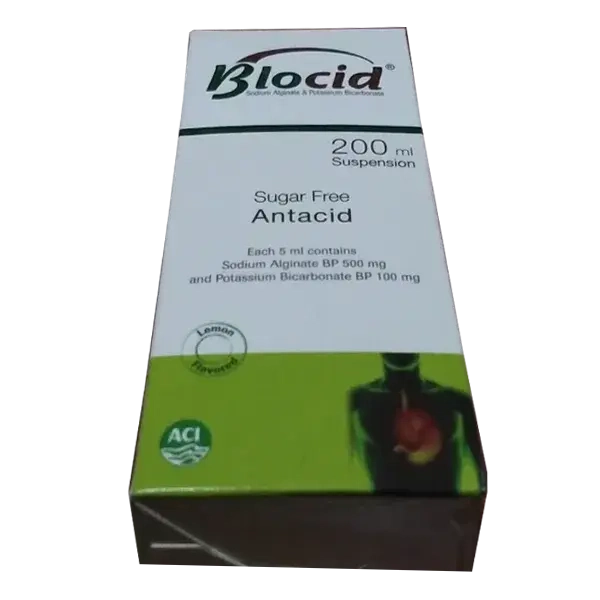Indications
Blocid is indicated for the treatment of symptoms resulting from the reflux of acid, bile and pepsin into the esophagus such as acid regurgitation, heartburn, indigestion for instance, after gastric surgery, as a result of hiatus hernia, during pregnancy, accompanying reflux esophagitis, including symptoms of laryngopharyngeal reflux such as hoarseness and other voice disorders, sore throats and cough. Blocid can also be used to treat the symptoms of gastroesophageal reflux during concomitant treatment with or following the withdrawal of acid suppressing therapy.
Pharmacology
This is the combination of Sodium Alginate and Potassium Bicarbonate. Sodium Alginate is a naturally occurring substance. It reacts with the acid in the stomach to form a gel. Potassium Bicarbonate also reacts with the acid in the stomach to form bubbles of carbon dioxide. These bubbles are trapped by the gel formed by Sodium Alginate and they allow the gel to float like a raft on top of the stomach contents. The raft prevents acid in the stomach from flowing back into the esophagus. This relieves the symptoms of reflux such as heartburn. The mode of action of this is physical and does not depend on absorption into the systemic circulation. The raft lasts for up to 4 hours on top of the stomach contents and is then broken down in the digestive system and excreted in the feces.
Dosage & Administration
Tablet:
Elderly: No dose modifications are necessary for this age group.
Hepatic Impairment: No dose modifications are necessary.
Renal Insufficiency: Caution if a highly restricted salt diet is necessary.
- Adults and children over 12 years: 1-2 tablets 3-4 times daily, after meals and before bedtime.
- Children 6-12 years: ½-1 tablet 3-4 times daily, after meals and before bedtime.
- Adults and children 12 years and above: 5-10 ml (1-2 teaspoonfuls) 3-4 times daily, after meals and before bedtime.
- Children 2-12 years: 2.5-5ml (½-1 teaspoonful) 3-4 times daily, after meals and before bedtime.
Elderly: No dose modifications are necessary for this age group.
Hepatic Impairment: No dose modifications are necessary.
Renal Insufficiency: Caution if a highly restricted salt diet is necessary.
Interaction
A time interval of 2 hours should be considered between this intake and the administration of other medicinal products, especially tetracyclines, fluoroquinolones, iron salts, thyroid hormones, chloroquine, bisphosphonates, and estramustine.
Contraindications
Sodium alginate and potassium bicarbonate is contraindicated in patients with known hypersensitivity to these.
Side Effects
In addition to the desired effect of the drug, some side effects may appear such as: nausea, constipation, diarrhea or headache. In these cases consult a physician In case too big dosage has been taken, there might appear a sensation of swelling. In this case it is advisable to consult a physician.
Pregnancy & Lactation
This combination (Sodium Alginate and Potassium Bicarbonate) can be used during pregnancy, if clinically needed. No known effect on breast-fed infants. This combination can be used during breastfeeding.
Precautions & Warnings
Sodium Alginate and Potassium Bicarbonate should be prescribed with caution in patients with renal impairment and congestive cardiac failure. Care needs to be taken in treating patients with hypercalcemia, nephrocalcinosis and recurrent calcium-containing renal calculi. There is a possibility of reduced efficacy in patients with very low levels of gastric acid. If symptoms do not improve after seven days, the clinical situation should be reviewed.
Overdose Effects
Overdosage with this formulation is a rare case. In case of overdose please consult with a registered physician.
Therapeutic Class
Antacids
Storage Conditions
Keep below 30°C temperature, away from light & moisture. Keep out of the reach of children.


